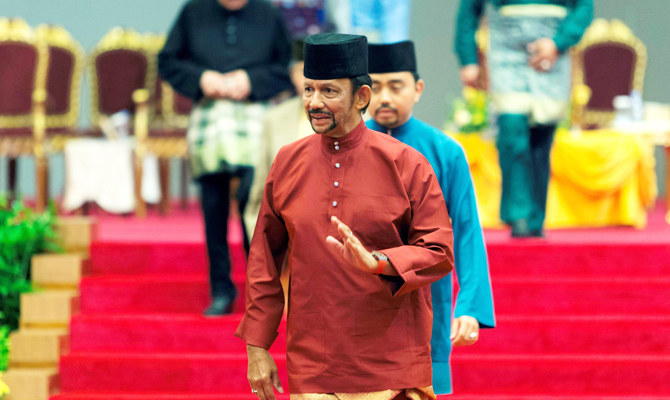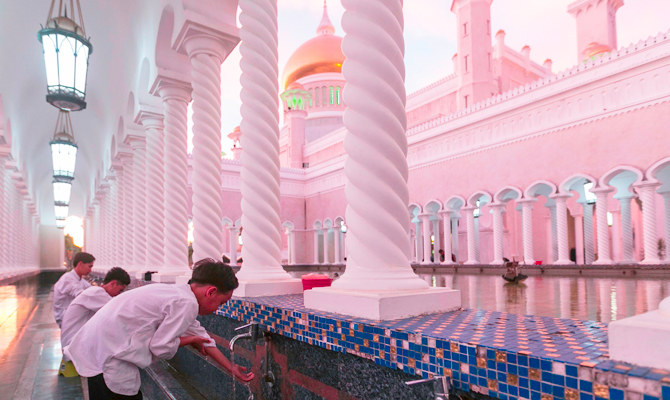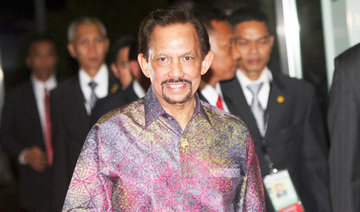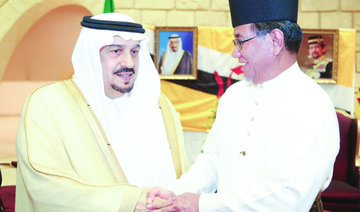BANDAR SERI BEGAWAN, Brunei: Brunei’s sultan called for Islamic teachings in the country to be strengthened as strict new Shariah punishments, including death by stoning for gay sex and adultery, were due to come into force on Wednesday.
The tough penal code in the tiny country on tropical Borneo island — ruled by the all-powerful Sultan Hassanal Bolkiah — is set to be fully implemented following years of delays.
The laws, which also include amputation of hands and feet for thieves, will make Brunei the first place in East or Southeast Asia to have a Shariah penal code at the national level, joining several mostly Middle Eastern countries such as Saudi Arabia.
Rape and robbery are also punishable by death under the code and many of the new laws, such as capital punishment for insulting the Prophet Muhammad, apply to non-Muslims as well as Muslims.
The decision to push ahead with the punishments has sparked alarm around the world, with the United Nations labelling them “cruel and inhumane” and celebrities, led by actor George Clooney and pop star Elton John, calling for Brunei-owned hotels to be boycotted.
In a public address to mark a special date in the Islamic calendar, the sultan called for stronger Islamic teachings but did not mention the new penal code.
“I want to see Islamic teachings in this country grow stronger,” he said in the nationally televised speech at a convention center near the capital Bandar Seri Begawan.
“I would like to emphasize that the country of Brunei is a... country that always devotes its worship to Allah.”
He said that he wanted the Muslim call to prayer to ring out in all public places, not just in mosques, to remind people of their Islamic duties.
The sultan, who has been on the throne for over five decades, also insisted that Brunei was a “fair and happy” country.
“Anyone who comes to visit this country will have a sweet experience, and enjoy the safe and harmonious environment,” he said.
Officials did not immediately confirm that the Shariah penal code had entered into force. At the weekend, the Brunei government said in a statement that the new punishments would be enforced from Wednesday.
The tough punishments have triggered worldwide condemnation.
Phil Robertson, deputy Asia director at Human Rights Watch, said the code was “barbaric to the core, imposing archaic punishments for acts that shouldn’t even be crimes.”
The sultan — who is one of the world’s wealthiest men and lives in a vast, golden-domed palace — announced plans for the code in 2013.
The new laws make sex between men punishable by death by stoning. For women convicted of having sexual relations with other women, the maximum punishment is 40 strokes of the cane or a maximum 10-year jail term.
The first section of the code was introduced in 2014 and included less stringent penalties, such as fines or jail terms for offenses including indecent behavior or skipping Friday prayers.
Clooney’s call to boycott nine Brunei-owned hotels in Europe and the United States last week catapulted the issue into the international headlines.
Since then, a series of well-known figures have lined up to add their names to the chorus of condemnation, including former US vice president Joe Biden and actress Jamie Lee Curtis.
Governments have weighed in, with the United States saying the punishments run counter to Brunei’s “international human rights obligations.”
“The United States strongly opposes violence, criminalization and discrimination targeting vulnerable groups,” said deputy State Department spokesman Roberto Palladino.
The sultan, who is the world’s second-longest reigning monarch, first called for the penal code in the late 1990s and it appears to enjoy broad support in the former British protectorate of about 400,000 people.
Analysts say he is seeking to burnish his Islamic credentials and shore up support among the country’s conservatives due to the waning fortunes of the oil-dependent economy, which has been ravaged by recession in recent years.
It is also unclear whether death by stoning will actually be implemented, as a high burden of proof is needed to hand down the punishment and Brunei has not executed anyone for decades.





























